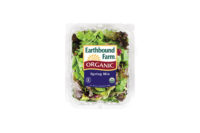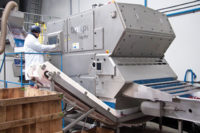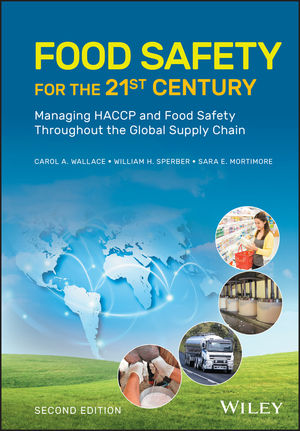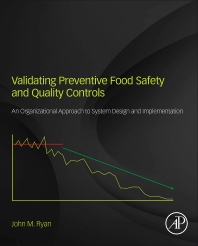Safety first
Two cold food experts discuss how food safety issues affect the plant floor.
 When they met this spring for an annual meeting in San Francisco, Refrigerated Foods Association (RFA) members discussed everything from sustainability to overseas markets and product development to produce. Nevertheless, food safety was a common theme in many RFA forums.
When they met this spring for an annual meeting in San Francisco, Refrigerated Foods Association (RFA) members discussed everything from sustainability to overseas markets and product development to produce. Nevertheless, food safety was a common theme in many RFA forums.
Here, Refrigerated & Frozen Foods follows up with Martin Mitchell, RFA’s technical director and a managing director at Certified Laboratories, Inc., Plainview, N.Y.; and William Schwartz, chief food safety officer at Orval Kent Foods Co., a Wheeling, Ill., refrigerated salads and side dishes processor.
R&FF: Marty, what food safety points did you most want to communicate to food processors?
Martin Mitchell: We discussed how HACCP – or some similar form of food safety system – will be required in upcoming food regulations. Most of our members already take a HACCP approach to food safety and find it successful in processing seafood or meat items. It is a logical jump to expand the system to all processed foods. During our last conference, we discussed and enthusiastically recommended the expansion of HACCP to all foods.
We also discussed validation and its impact on operations – both from a process point of view as well as a HACCP requirement. We discussed how to validate existing processes and members want to better understand this topic. We have scheduled a webinar on this important subject.
R&FF: Bill, what food safety topic drew your interest during the RFA meeting?
Bill Schwartz: My top agenda item involved a session titled, “Closing the Produce Gap.” The speakers were all leaders in the field and I wasn’t disappointed. I came away with a better understanding of how they approach food safety in the produce industry. Speakers shared details about GAP auditing and state-of-the processing control practices. They also provided a glimpse at future produce category trends and regulatory issues.
Their insights meshed well with two RFA technical projects in 2009. Our association prepared findings about “The Safety of Fresh and Fresh-cut Produce” and “Best Practices for Produce Safety in a Refrigerated Salad Processing Plant.”
I also looked forward to several “open discussion” technical programs. Just days before our meeting, there was industry news about recalls involving hydrolyzed vegetable protein (HVP). Marty had an excellent handle on the topic, which precipitated lively discussion. It was fortunate for our group that we had legal experts there – as meeting speakers – and they were able to join our conversations.
R&FF: Marty, what regulatory issues have the most potential to affect RFA members' food safety programs?
Mitchell: All of the proposed new food safety regulations will impact Refrigerated Foods Association members. Literally, during our annual conference there was a major announced recall of HVP. This gave us a real life case study regarding the potential impact of the reportable food registry – as well as the need for process validation.
R&FF: Bill, what’s most important about RFA's new food safety video for experienced employees?
Schwartz: This DVD provides the refrigerated food industry with an up-to-date educational experience for mid-level supervisors. Our industry is constantly seeking talented managers and that talent often comes from outside the food sector. Chapters cover all the key areas required for supervisors. The DVD provides a self-guided tour – with tests included – for a new supervisor. It helps them learn about industry expectations and why specific plant practices are important.
It also is a great refresher for experienced supervisors as well. And because the DVD and the tests also come in Spanish, they help you educate supervisors in two languages. Orval Kent Foods has built its new supervisor training program around this new DVD.
R&FF: The RFA conference also covered issues and opportunities involving the deli, fresh-cut produce, European trends, new products and sustainability. Was there a another session that had you considering food safety implications? How so?
Schwartz: A session on the “European Influence on the Food Chain” was of special interest to me. In many ways, manufacturing practices and procedures in Europe are advanced compared to typical North American practices. This also appears to be true for food safety practices. This presentation triggered many thoughts for me about European food safety elements – and how Orval Kent could apply these programs to its daily practices.
Mitchell: I found myself discussing trends in food outbreak detection. The Centers for Disease Control has embraced pulsed-field gel electrophoresis and this technology can help identify a food poisoning outbreak as it ties together seemingly disparate events. This technology – along with shopper interviews, loyalty card data and other modern methods – allows us better understand the sources of any outbreak. In combination with the reportable food registry, I think food outbreak detection has become a “game changer” and will result in many more recalls.
Watch and learn
To help food processors meet stringent government regulations and apply best practices in food safety, the Refrigerated Foods Association (RFA) produced an employee training video, which the organization released during its annual convention this spring.
The “RFA Food Safety Training for Experienced Employees” DVD shows actual working conditions at Reser’s Fine Foods, Inc., a refrigerated foods processor based in Beaverton, Ore. Officials say the video addresses experienced, non-technical food employees and it features updated information – including what food employees should know about third-party audits, food defense and allergens.
“Our industry is facing substantial changes in the regulatory structures in which we operate,” says Steve Loehndorf, Reser’s technical director and RFA treasurer. “There are major reforms to the FD&C Act and the FDA is being granted much more authority. The best way to prepare for these changes and be successful is through training and making improvements in all operational practices. This DVD supports that initiative.”
The RFA Food Safety Training DVD for Experienced Employees runs about 90 minutes and is divided into 11 modules, each with its own introduction, conclusion and set of multiple choice and true/false review questions. A training manual is included. It is designed to be customized to a company’s own policies and procedures. There are English and Spanish versions on the same DVD. DVD co-sponsors are RFA members Certified Laboratories, IPL Inc. and Ecolab, Inc.
Association members receive one free copy of the new RFA Food Safety Training DVD Program as a part of their membership. For more information on purchasing a copy of the new DVD through the authorized distributor Silliker, Inc. or on RFA membership, contact RFA at www.refrigeratedfoods.org or call 770-452-0660.

Here, Refrigerated & Frozen Foods follows up with Martin Mitchell, RFA’s technical director and a managing director at Certified Laboratories, Inc., Plainview, N.Y.; and William Schwartz, chief food safety officer at Orval Kent Foods Co., a Wheeling, Ill., refrigerated salads and side dishes processor.
R&FF: Marty, what food safety points did you most want to communicate to food processors?
Martin Mitchell: We discussed how HACCP – or some similar form of food safety system – will be required in upcoming food regulations. Most of our members already take a HACCP approach to food safety and find it successful in processing seafood or meat items. It is a logical jump to expand the system to all processed foods. During our last conference, we discussed and enthusiastically recommended the expansion of HACCP to all foods.
We also discussed validation and its impact on operations – both from a process point of view as well as a HACCP requirement. We discussed how to validate existing processes and members want to better understand this topic. We have scheduled a webinar on this important subject.
R&FF: Bill, what food safety topic drew your interest during the RFA meeting?
Bill Schwartz: My top agenda item involved a session titled, “Closing the Produce Gap.” The speakers were all leaders in the field and I wasn’t disappointed. I came away with a better understanding of how they approach food safety in the produce industry. Speakers shared details about GAP auditing and state-of-the processing control practices. They also provided a glimpse at future produce category trends and regulatory issues.
Their insights meshed well with two RFA technical projects in 2009. Our association prepared findings about “The Safety of Fresh and Fresh-cut Produce” and “Best Practices for Produce Safety in a Refrigerated Salad Processing Plant.”
I also looked forward to several “open discussion” technical programs. Just days before our meeting, there was industry news about recalls involving hydrolyzed vegetable protein (HVP). Marty had an excellent handle on the topic, which precipitated lively discussion. It was fortunate for our group that we had legal experts there – as meeting speakers – and they were able to join our conversations.
R&FF: Marty, what regulatory issues have the most potential to affect RFA members' food safety programs?
Mitchell: All of the proposed new food safety regulations will impact Refrigerated Foods Association members. Literally, during our annual conference there was a major announced recall of HVP. This gave us a real life case study regarding the potential impact of the reportable food registry – as well as the need for process validation.
R&FF: Bill, what’s most important about RFA's new food safety video for experienced employees?
Schwartz: This DVD provides the refrigerated food industry with an up-to-date educational experience for mid-level supervisors. Our industry is constantly seeking talented managers and that talent often comes from outside the food sector. Chapters cover all the key areas required for supervisors. The DVD provides a self-guided tour – with tests included – for a new supervisor. It helps them learn about industry expectations and why specific plant practices are important.
It also is a great refresher for experienced supervisors as well. And because the DVD and the tests also come in Spanish, they help you educate supervisors in two languages. Orval Kent Foods has built its new supervisor training program around this new DVD.
R&FF: The RFA conference also covered issues and opportunities involving the deli, fresh-cut produce, European trends, new products and sustainability. Was there a another session that had you considering food safety implications? How so?
Schwartz: A session on the “European Influence on the Food Chain” was of special interest to me. In many ways, manufacturing practices and procedures in Europe are advanced compared to typical North American practices. This also appears to be true for food safety practices. This presentation triggered many thoughts for me about European food safety elements – and how Orval Kent could apply these programs to its daily practices.
Mitchell: I found myself discussing trends in food outbreak detection. The Centers for Disease Control has embraced pulsed-field gel electrophoresis and this technology can help identify a food poisoning outbreak as it ties together seemingly disparate events. This technology – along with shopper interviews, loyalty card data and other modern methods – allows us better understand the sources of any outbreak. In combination with the reportable food registry, I think food outbreak detection has become a “game changer” and will result in many more recalls.
Watch and learn
To help food processors meet stringent government regulations and apply best practices in food safety, the Refrigerated Foods Association (RFA) produced an employee training video, which the organization released during its annual convention this spring.
The “RFA Food Safety Training for Experienced Employees” DVD shows actual working conditions at Reser’s Fine Foods, Inc., a refrigerated foods processor based in Beaverton, Ore. Officials say the video addresses experienced, non-technical food employees and it features updated information – including what food employees should know about third-party audits, food defense and allergens.
“Our industry is facing substantial changes in the regulatory structures in which we operate,” says Steve Loehndorf, Reser’s technical director and RFA treasurer. “There are major reforms to the FD&C Act and the FDA is being granted much more authority. The best way to prepare for these changes and be successful is through training and making improvements in all operational practices. This DVD supports that initiative.”
The RFA Food Safety Training DVD for Experienced Employees runs about 90 minutes and is divided into 11 modules, each with its own introduction, conclusion and set of multiple choice and true/false review questions. A training manual is included. It is designed to be customized to a company’s own policies and procedures. There are English and Spanish versions on the same DVD. DVD co-sponsors are RFA members Certified Laboratories, IPL Inc. and Ecolab, Inc.
Association members receive one free copy of the new RFA Food Safety Training DVD Program as a part of their membership. For more information on purchasing a copy of the new DVD through the authorized distributor Silliker, Inc. or on RFA membership, contact RFA at www.refrigeratedfoods.org or call 770-452-0660.
Looking for a reprint of this article?
From high-res PDFs to custom plaques, order your copy today!









